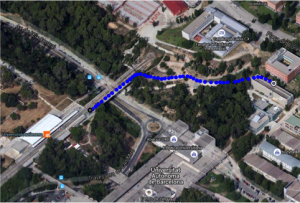New and emerging family forms around the globe
Centre d’Estudis Demogràfics, Barcelona 21-22 March 2018
New patterns of family formation are emerging around the globe. In some regions, such as Europe and the Americas, cohabitation and childbearing within cohabitation have increased rapidly over the past few decades, sometimes reflecting a long tradition of nonmarital unions. In other areas, such as China, Japan, Israel and the Philippines, cohabitation is just starting to emerge, surprising scholars who thought that the marital regime was immutable. Yet the ways in which these new family behaviors are emerging differs dramatically depending on context. In some countries, for example Sweden and Norway, marriage is often postponed until after childbearing, while in others, such as Japan and China, premarital cohabitation has increased, but nonmarital childbearing is still considered a taboo. And in other parts of the world, cohabitation may be a marginal behaviour, but marriage is changing in other ways, possibly being delayed or foregone due to modern social and economic realities.
The emergence of these behaviors may have implications for individuals and societies. The rise of cohabitation and separation may lead to greater life uncertainties, and potentially exacerbate inequality. Increases in non-marriage may leave a larger group disaffected and vulnerable, especially at older ages. As a consequence, recent patterns of partnership formation may be having substantial effects on not only on population composition, but also on future well-being. On the other hand, the new behaviors may be a reaction to changing social norms, shifting values, and/or increased globalization. Changes in the family may simply be part of the normal process of societal development – indeed reflecting greater gender equality – and not a cause for alarm. Further research is needed to provide insights into the underlying explanations for the new trends and to what extent these changes are altering societies.
This panel will bring together researchers from around the world to discuss these new behaviors and their consequences. The panel follows up on the IUSSP nuptiality panel (2011-2015), which convened conferences on first union patterns and divorce and produced two special collections. The nuptiality panel covered a wide variety of behaviors, but emphasized changes in the tempo and quantum of more conventional behaviors (e.g. marriage and divorce). We will focus on more flexible forms of partnerships, such as cohabitation, living-apart-together relationships, and repartnering. The panel’s main goal is to address theoretical explanations for changes in family formation in cross-national perspective, and to assess the consequences for populations and societies. Overall, we aim to gain a better understanding of which explanations are universal and which are unique.
Wednesday, March 21, 2018
9:15-9:45 Registration
9:45-10:00 Introduction to the Workshop
Albert Esteve (Centre d’Estudis Demogràfics)
Maria Midea Kabamalan (University of the Philippines)
(Chair morning: Mariona Lozano)
10:00-11:30 Global trends in marriage and cohabitation I
How have pro-natalist values and rising nonmarital fertility shaped fertility trends in the Philippines? A mixed methods exploration
Bernice Kuang and Brienna Perelli-Harris (University of Southampton)
Explaining marital Patterns and Trends in Mongolia
Naranchimeg Baatar (National University of Mongolia)
Female Headed Families in India
Ankita Chakrabarti (Jawaharlal Nehru University)
11:30-12:00 Coffee Break
12:00-13:30 Global trends in marriage and cohabitation II
Intergenerational Patterns of Family Formation in sub-Saharan Africa: Does Context Matter?
Oluwaseyi Somefun and Clifford Odimegwu (University of the Witwatersrand, Johannesburg)
Family trajectories after the first union dissolution: a study of Uruguayan woman
Mariana Fernández Soto (Universidad de la Republica, Uruguay)
Serial cohabitation in Germany: Determinants and Outcomes of Complex Partnership Histories
Nicole Hiekel (University of Cologne) and Barbara E. Fulda (Technical University Chemnitz)
13:30-15:00 Lunch
(Chair afternoon: Sergi Vidal)
15:00-16:30 Cohabitation and Marriage in Comparative Perspective
The Role of Family Law in Shaping Variation in Family Behaviour: Insights from the Swiss-French Border Region around Geneva
Sebastian Kluesener (Max Planck Institute for Demographic Research, Rostock) and Jonathan Zufferey (University of Geneva)
How Does Cohabitation Change People’s Attitudes towards Divorce?
Martin Kreidl (Masaryk University) and Zuzana Zilincikova (Masaryk University)
Employment and the economic situation of cohabiting and married parents in European countries
Anna Garriga (Pompeu Fabra University)
16:30-16:45 Coffee
16:45-17:45 Discussion: New trends in Marriage and Cohabitation around the World
20:00 Dinner at Barcelona at Sagardi BCN Gotic. Carrer de l’Argenteria, 62, 08003 Barcelona
Thursday, March 22, 2018
(Chair morning: Alícia Adserà)
9:30-11:00 Romantic Relationships
Marriage, cohabitation and fertility as family formation pathways in South Africa
Nompumelelo Nzimande (University of KwaZulu-Natal)
Fatherhood and the Progression of Romantic Relationships
Sharon Sassler, Laura Tach, and Emily Parker (Cornell University)
Marriage, Romanticism and Sexuality: On Navigation among Young Educated Females in the Paradoxical Landscape of Iran
Farideh Farahani (Iran)
Discussion on changes in romantic relationships
11:00-11:30 Coffee
11:30-13:00 Singlehood
Normative change in Asian marriage markets and the rise of singlehood (Albert Esteve, presenting author)
Albert Esteve (Centre d’Estudis Demogràfics)
Rethinking the “Retreat from Marriage” in Japan
James Raymo (University of Wisconsin at Madison)
Gender-role ideology, labour market setting and new family forms: The case of life-long singlehood in Europe
Daniela Bellani and Bruno Arpino (Universitat Pompeu Fabra)
Discussion on main themes on emergence of lifelong Singlehood
13:00-14:30 Lunch
(Chair afternoon: Diederik Boertien)
14:30-16:00 LATs & Same-sex marriage
Towards a typology of commitment in LAT relationships
Ann Evans and Edith Gray (Australian National University)
LAT Relationships among Canadian Young Adults
Lisa Strohschein (University of Alberta)
Same-sex marriage in Europe
Maks Banens (Université Lyon 2)
16:00-16:15 Coffee
16:15-16:45 Summary and Synthesis
Brienna Perelli-Harris (University of Southampton)
16:45-18:00 Discussion and New directions for research
20:30 Dinner at Barcelona place to be decided
- Hotel H10 Casanovas 4* https://www.h10hotels.com/es/
hoteles-barcelona/h10-casanova
- Hotel H10 Universitat 4* https://www.h10hotels.com/es/
hoteles-barcelona/h10- universitat
- Barcelona Center 4* https://www.hotelescenter.es/
hotel-barcelona-center/
- Banys Orientals 4* http://www.
hotelbanysorientals.com/
- NH Barcelona Centro 3* https://www.nh-hoteles.es/
hotel/nh-barcelona-centro
- Nouvel Hotel 3* http://www.hotelnouvel.es/
- Hotel Constanza 2* https://hotelconstanza.com/es/
-
Access by train
With Ferrocarrils de la Generalitat de Catalunya (FGC– Government of Catalonia Railways)
The FGC lines stopping at the Universitat Autònoma station are the S2 (Barcelona-Sabadell) and S6 (Barcelona-Universitat Autònoma). The trains run every 6 minutes (minimum) and 15 minutes (maximum). Have in mind that 2 zones ticket is required.
http://www.fgc.net/cat/index.asp
Route from the Universitat Autònoma station to the CED:
At the station, walk along the platform in the same direction as the train, exit through the automatic gates using your ticket and continue along the raised bridge and path until reaching the CED building. The walk is no more than five minutes.
Organizers:
- Brienna Perelli-Harris as Scientific Coordinator and Chair of the Panel B.G.Perelli-Harris@soton.ac.uk
- Albert Esteve as local Scientific Coordinator and member of the Panel aesteve@ced.uab.cat
- Eulàlia Camps as local organizer in charge of logistics ecamps@ced.uab.cat
Organized by:

Supported by:



